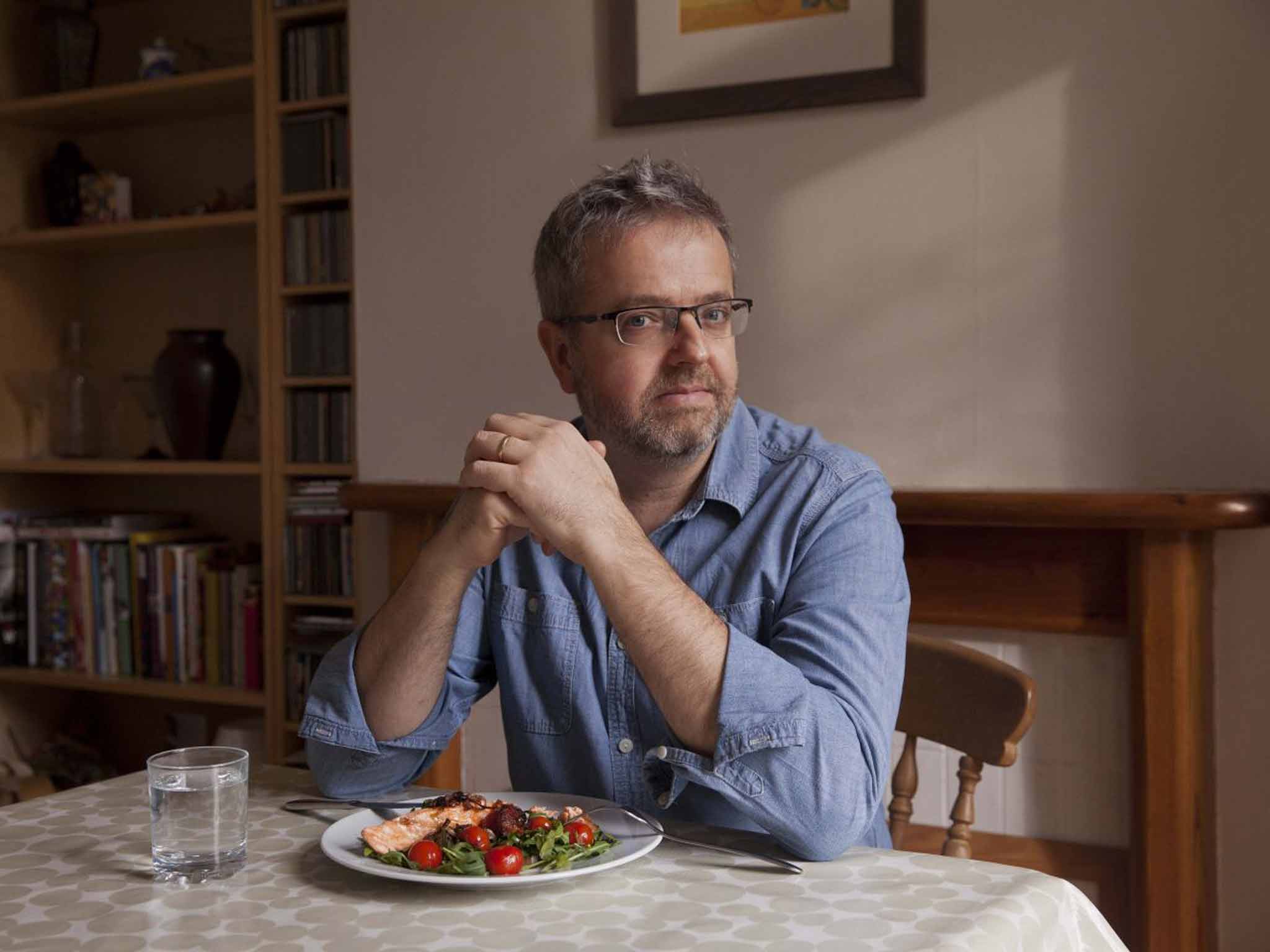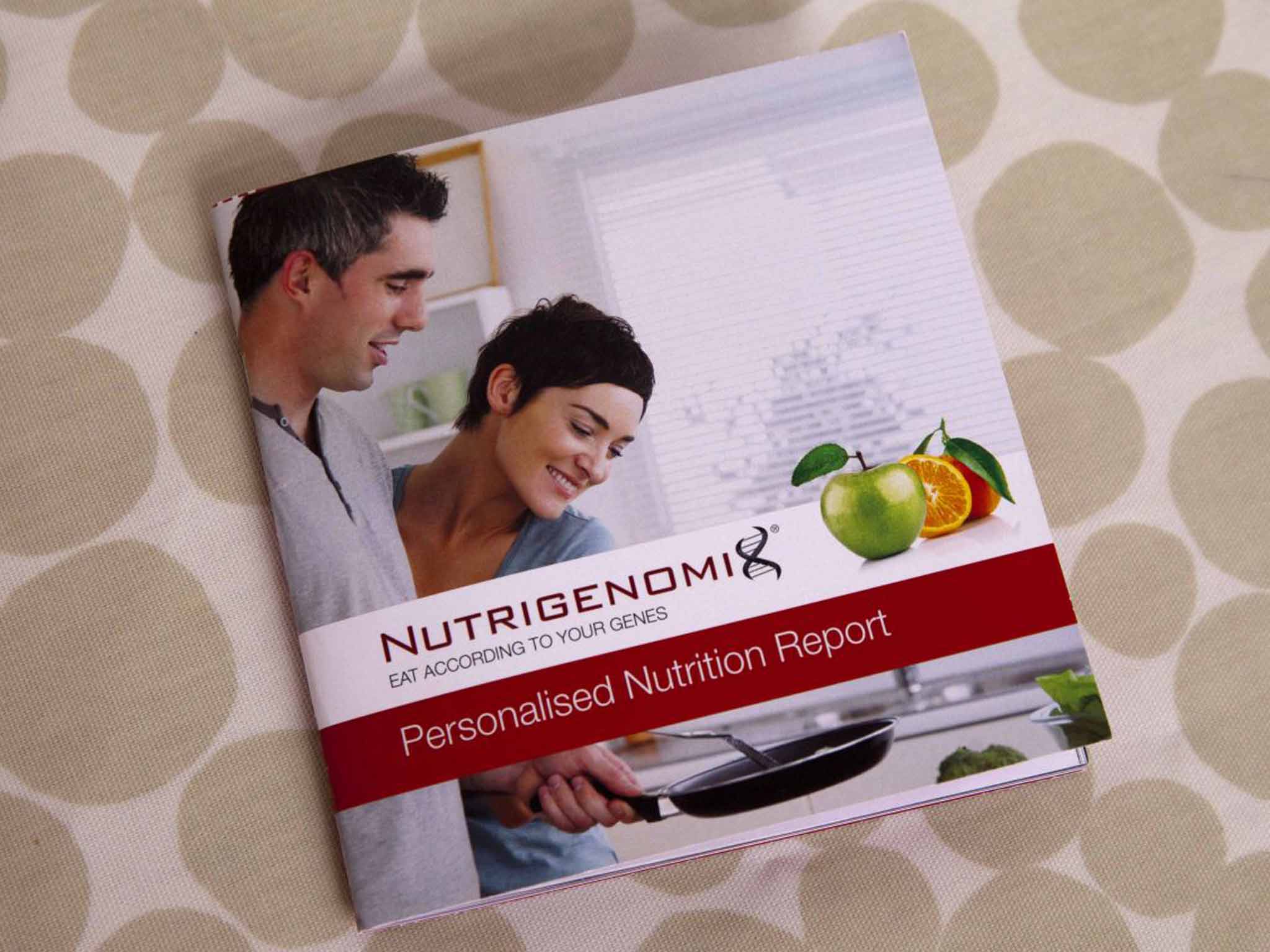DNA diet: The genetic test that alerts you to potentially deadly effects of salt, caffeine or saturated fat
Will nutritional genomics make it easier to follow a healthy diet? Clint Witchalls sends off his DNA for a nutritional diagnosis

Your support helps us to tell the story
From reproductive rights to climate change to Big Tech, The Independent is on the ground when the story is developing. Whether it's investigating the financials of Elon Musk's pro-Trump PAC or producing our latest documentary, 'The A Word', which shines a light on the American women fighting for reproductive rights, we know how important it is to parse out the facts from the messaging.
At such a critical moment in US history, we need reporters on the ground. Your donation allows us to keep sending journalists to speak to both sides of the story.
The Independent is trusted by Americans across the entire political spectrum. And unlike many other quality news outlets, we choose not to lock Americans out of our reporting and analysis with paywalls. We believe quality journalism should be available to everyone, paid for by those who can afford it.
Your support makes all the difference.My blood pressure has always been in the healthy range, so it came as a bit of surprise when my doctor told me it was high. At the end of the consultation, she took a second reading. It was slightly lower than the first reading, but still in the hypertensive range.
I rationalised that I must be suffering from a case of white coat syndrome – a phenomenon where the clinical setting triggers temporary high blood pressure. But if it was a case of white coat syndrome, why hadn't I had it before? What if – heaven forfend – I have hypertension? I don't smoke, I exercise regularly, my job isn't stressful and nobody in my immediate family has hypertension. Maybe a lifetime of overindulging in salty food is finally catching up with me.
I knew that two blood-pressure readings weren't enough to make a diagnosis of hypertension, but it had me worried. If further tests confirmed that I had hypertension, I'd have to cut down on my favourite foods: bacon, Parma ham, anchovies, capers, feta cheese, smoked salmon, bagels. The list goes on.
The idea of eating bland food for the rest of my life was starting to get me down, but as I walked back from the doctor's surgery, I remembered reading that there are some people whose blood pressure is not affected by salt intake. Maybe I'm one of those people, I thought.
I'm not one of those people.
I now know this for a fact. A couple of weeks after my visit to the doctor, I read a study in the open-access journal, Plos One, which compared gene-based dietary advice with standard dietary advice (of the type government health departments dispense). Gene-based dietary advice comes from a newish field of study called nutritional genomics. It's the scientific study of the relationship between genes, nutrition and health. For example, genetic tests might show that you have a version of the gene that makes it difficult for your body to process folate, so you might need to get more folate in your diet. This particular research, conducted by the University of Toronto, looked at the genes (indirectly) involved in how our bodies process caffeine, salt, vitamin C and sugar.
The researchers found that subjects who were told that they carry a version of the gene associated with salt intake and high blood pressure significantly reduced their salt intake compared with the group that received the standard advice for salt intake. No significant changes were found for the other dietary components: caffeine, vitamin C and sugar. The authors of the study believe that this is because most of the 138 people in the study were already meeting the recommendations for these dietary components at the start of the study.
I contacted the lead researcher, Ahmed El-Sohemy, professor of nutritional sciences at the University of Toronto and founder of the nutritional genomics firm, Nutrigenomix, and asked him if he would analyse my DNA. He agreed. Usually, the service is available only through a dietitian – Nutrigenomix doesn't sell its test directly to consumers. For 300 Canadian dollars (around £170), the customer has seven genes analysed and they get a consultation with a dietitian to discuss the results. Declaration of interest: I did not pay for my test. I sent a saliva sample to Nutrigenomix and within a couple of weeks received a personalised nutrition report that listed seven genes and their implications for my diet. And that's how I found out that I have a version of the ACE genes that means my salt intake is likely to have an effect on my blood pressure.

The report advised me to limit my sodium intake to 1,600mg a day – about two-thirds of a teaspoon of salt. (Sodium x 2.5 = salt.) The standard recommendation for adults is to not exceed 6g salt a day (about one teaspoon).
Although the ACE gene version that I possess is common, having this knowledge about my own genetic make-up has motivated me to cut back on salt. It's been six weeks since I received the report and I'm still following the advice. This may not sound like very long, but it's about five weeks and six days longer than I usually follow dietary advice, even when it comes from a healthcare professional.
At a recent health check-up, the practice nurse said to me: "Your BMI is 27, which means you're overweight. You need to eat less saturated fat and get more exercise."
I asked her if she'd seen the recent study in Japan that found that people who are overweight in their middle years tend to live longer than people who are a normal weight.
"Yes," said the nurse, "but I don't think your diet is the same as a Japanese person's diet."
Touché.
I ate a bit more oily fish for several days after that exchange, but I didn't make any long-term changes to my diet.
Body mass index (BMI) is simple to calculate, doesn't require expensive equipment and has lots of evidence to back it. It's a great tool for doctors and epidemiologists, but it's not such a great tool for motivating people to change their diets. Although the measure is widely used, it appears to have had little impact on slowing the rise in obesity. And even if BMI is motivating for a few people, it's usually motivating at a point where there's already a problem.
"We know that prevention is always better, and easier, than treatment," El-Sohemy says. "We need to focus on how to get people who are healthy to stay healthy."
Nutritional genomics aims to do that: stop health problems occurring in the first place. And it seems to be much more motivating than one-size-fits-all dietary advice. There are no "maybes" to hide behind. Having specific knowledge about what dietary changes will or won't make a difference is empowering.
In many countries, the standard recommendation for caffeine intake is: don't exceed four cups of coffee a day. "This is fine if you're among the 50 per cent of the population that metabolises caffeine quickly, but there's evidence that if you are a slow metaboliser then drinking any more than two cups per day will increase your risk of a heart attack," El-Sohemy says. "This is an example of how the current recommendations are inadequate for a sizeable part of the population. Some have argued that you don't need genetic testing if you just follow the recommendations for healthy eating, but this example with caffeine shows this to be false."
But if gene-based dietary advice is so effective, why focus on just seven dietary components? The Nutrigenomix report only looks at vitamin C, folate, glycaemic index, omega-3 fat, saturated fat, sodium and caffeine.
"Research on health behaviour change has shown that people can act on only a few pieces of actionable advice," says El-Sohemy. "So the reason why I think nutritional genomics is ready for prime time is because we now have evidence that such information can motivate the necessary behaviour, and more importantly, in those who need it the most."
My genetic profile tells me that I need more omega-3 fat and folate in my diet. So, aside from cutting down on salt, I've started eating a lot more oily fish (omega-3) and foods that are rich in folate, such as spinach, lettuce, avocado and lentils. It's not about losing weight or feeling better, but about long-term health impacts. In my case, it's about reducing the risk of heart disease, stroke and kidney disease.
But Giles Yeo, director of genomics at the MRC Metabolic Diseases Unit at the University of Cambridge, wonders what happens when people are told that their genes don't show an elevated risk. For example, my report shows that, for saturated fat, my risk is "typical" as opposed to "elevated". "What do you grasp from the meaning 'typical'?" Yeo asks. "Do you follow their advice, saying, I'm typical, so I'm probably OK? I can eat as much saturated fats as I want."
I don't have the version of the APOA2 gene that puts me at increased risk of obesity when my saturated fat intake is high. My risk is "typical". So what does Nutrigenomix suggest I do? They suggest I limit my saturated fat intake to less than 10 per cent of my total energy consumption. And what do they suggest people with elevated risk should do? Exactly the same, but they add: although the recommendation for both genotypes is the same, it is most important that clients with the CC genotype [the one with elevated risk] limit their intake of saturated fat to 10 per cent of energy, since they are more susceptible to obesity when consumption is greater.
Yeo is right. Since receiving the report, I've only focused on dietary components where my risk factor is elevated and ignored the rest. But I was ignoring the advice before I received the personalised nutrition report anyway, so surely three out of seven positive dietary changes is better than zero out of seven?
Join our commenting forum
Join thought-provoking conversations, follow other Independent readers and see their replies
Comments